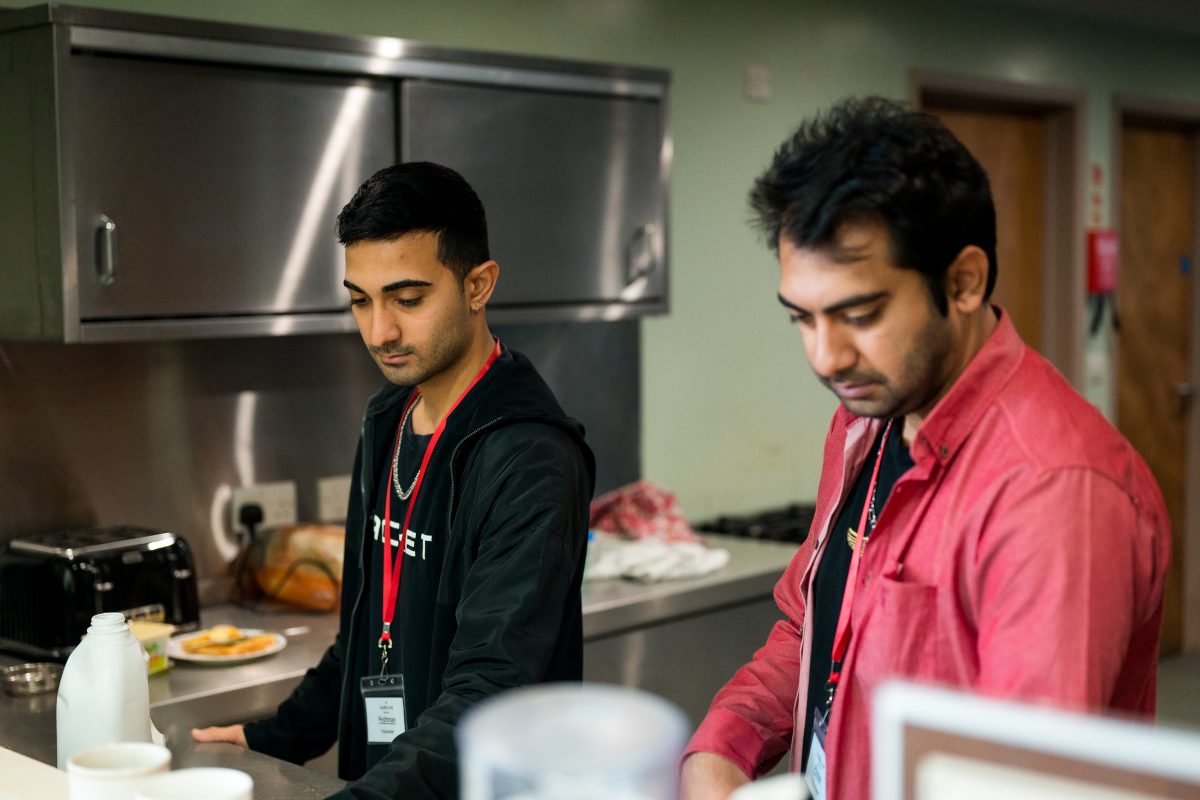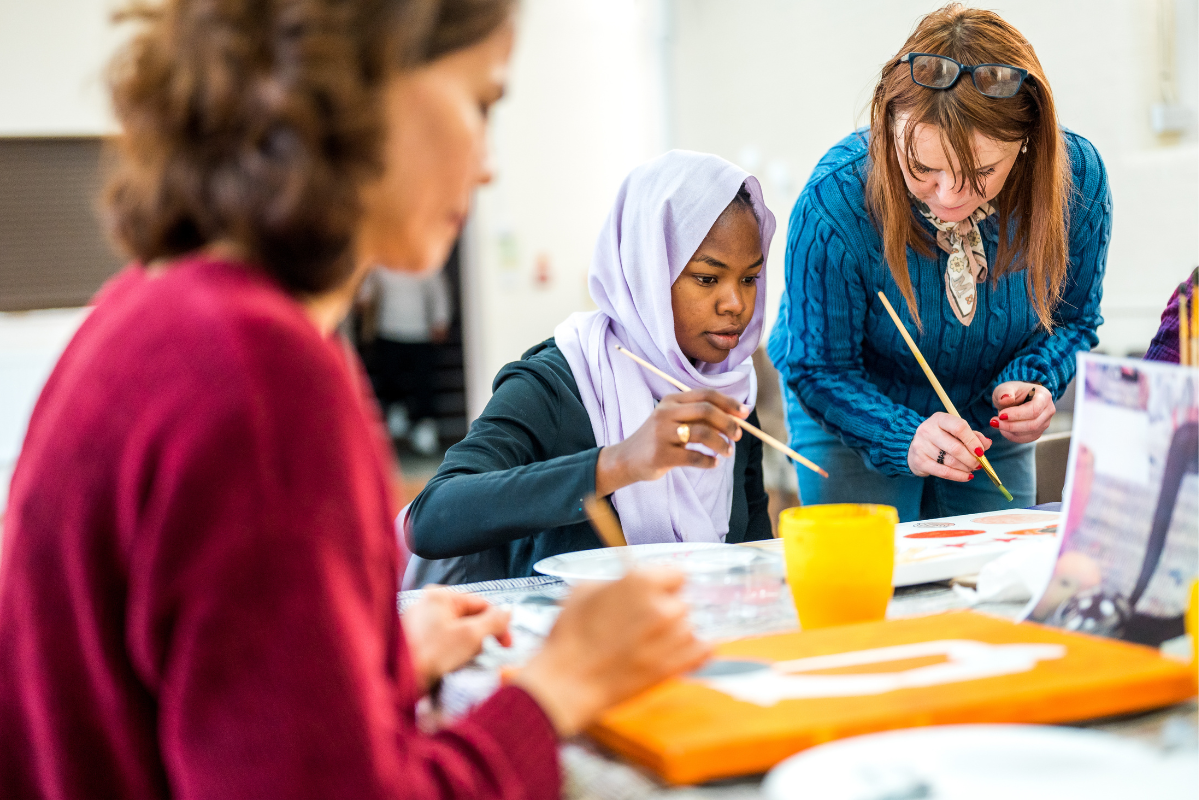The Harbour Project
The Harbour Project offers community and advice to those who’ve risked their lives, families and homes fleeing war and persecution. The charity provides access to healthcare, education and legal representation.
The Harbour Project offers community and advice to those who’ve risked their lives, families and homes fleeing war and persecution. The charity provides access to healthcare, education and legal representation.
Charity location
Grant size
Funding period
Coming to a stop outside St Luke’s Church on Swindon’s leafy Broad Street, there is not much to suggest you’d arrived at one of the region’s largest and most respected refugee and asylum charities.
The Harbour Project, began here in 2000 when Kosovar Albanian refugees fled the fighting in former Yugoslavia and arrived in Swindon. A group of entrepreneurial volunteers sprang into action and arranged clothing, supplies, food and friendship. Shortly afterwards the project registered as a charitable trust and since 2006, when the Home Office designated Swindon a ‘dispersal town’ for incoming refugees, the charity has grown rapidly.
Today the Harbour offers community and advice to those who’ve risked their lives, families and homes fleeing war and persecution.
They offer a holistic ‘lifecycle of support’, beginning with access to healthcare, education and legal representation. The Harbour’s ten-strong team are accredited by the Office of the Immigration Services Commissioner to give asylum and protection advice to the 750 ‘visitors’ on their books, hailing from 53 countries.
Through the Harbour, visitors can get help in obtaining drivers licenses, Universal Credit, employment, and mental health support.
Their Monday to Friday drop-in sessions offers an opportunity for visitors, staff and volunteers to connect over tea and toast whilst upstairs English and Maths classes run throughout the day.

In the front office, visitors sit with the team to discuss housing and psychological needs, access to emergency food and travel tokens. In the last three years, more than 300 bicycles – donated to the charity – have been given to visitors to help them get around town.
The charity is funded in part by a three-year, core costs grant of £99,684 by Lloyds Bank Foundation. This flexible funding means the charity can spend it in a variety of ways, and it is not fixed to any particular roles or costs.
Entering directly into the front office, you’re greeted by a welcoming smile and a warm wave of spirited laughter, clinking cups of tea, and action coming from every corner. We’re welcomed in and introduced to Claire Garrett, CEO of the Harbour Project. She warns us it’s set to be a busy day as we’re guided across the room. We’re not the only guests today as she explains that the Mayor of Swindon and his wife are due imminently.

Volunteers prepare breakfast at the Harbour Project's kitchen
Walking through the space, we note the plexiglass screens and hand sanitiser on each desk as Claire shares the impact of the pandemic on the charity and its visitors. Forced to close its in-person services for the first time during the initial lockdown, the charity began welfare calls to ensure their visitors were informed and connected.
By April – utilising their relationships with local businesses and farms - they began food parcel deliveries, giving away £20,000 in food by the end of the year. “What we learnt from the food was that it was less about what was in the bag, and more about the connection,” says Claire. “People were saying to us ‘you’re the only person who has checked I’m alive.’”
The next big challenge was getting visitors – whose accommodation often lacks Wi-Fi – connected to each other and to vital information.
Raising more than £20,000 the charity was able to equip visitors with a mobile Wi-Fi router and a tablet, allowing them access to classes which had been brought online.
“A bonus that I wasn’t expecting – if you’d asked me before whether you could volunteer at the Harbour, I’d say ‘yes, but it’s got to be Monday to Friday, 11am to 2pm’,” Claire explains. “But now we have volunteer teachers who work full-time and they teach in the evening. Now I find a student, and I find a teacher, and I put them together and they decide their own timetable.”
We’re shown into a large hall set up for the drop-in with tables and chairs, ping pong, table-top football, and a space to browse donated clothing. Through an open hatch into the adjoining kitchen, two volunteers are preparing tea and toast for the quickly assembling crowd filling the room.
Remarking on how busy the drop-in is, Claire smiles and assures us it's actually quieter than she’d expected. “Our volumes have increased - we’ve welcomed another 220 visitors since April. There is no other organisation in Swindon that does what we do. And in fact there are other dispersal towns where there is no Harbour. Which breaks my heart – where do people go?”
Claire pauses for a moment, surveying the room. “We have had streams and streams of refugees from Afghanistan at our door saying ‘help me! Help my family!’ I can’t turn them away. I might not have the answers but – and I think that’s probably what every charity feels from the last 12 months during the pandemic – we’re still here. We’ve turned up every day because their needs are still there, so who’s going to respond to that?”

A Harbour Project staff member plays a game with a family
Across from us a mother and her two young children are laughing and eating biscuits over a game of Yahtzee with a member of staff.
“Someone asked me the other day ‘What are the Harbour’s values?’”, says Claire. “Our simple answer is, be nice, be kind. We’re not the police, we’re not the Home Office, we’re not solicitors – we can’t influence those decisions about what’s happening with someone’s asylum claims. But for a lot of people who walk through that door, we’re the first smiling face they’ve seen in the UK.”
Resting against the hatch through to the kitchen where volunteers are busy at work, Claire shares how the Foundation’s core cost funding has impacted their work. "About 85% of our costs are core costs – that’s our rent, salaries, IT, stationery. The activities you see here today, don’t cost very much to run"
“Packets of biscuits and boxes of tea - I can do that! What I believe our visitors need, and what the town of Swindon needs, is the surety that we’re open every day. That’s the vital role the Lloyds funding allows us to have. And the multi-year grant makes a big difference because it means I’m not constantly on that treadmill of looking for money.”
As part of the Foundation’s development support, the Harbour Project was matched with local Halifax colleagues Ethan and Nick in late 2020, to explore ways in which surrounding branches can support visitors.
“We started with providing a donation of basic staples – food and toiletries – and it’s blossomed into a conversation on the practicalities of visitors holding money in a bank account,” said Nick Simons, Bank Manager at Halifax Swindon, when we sat down earlier that day. “It’s a real challenge and ID is a big, big problem. So we’ve worked on checks and procedures and what we can do to support them.”
“For a refugee who will have rent to pay, maybe claiming Universal Credit, looking for work – they need a bank account!” explains Claire. “It’s what we all need to be able to get on. Nick and Ethan have been amazing. We’ve had people who have been unable to open a bank account."

Nick, Claire and Ethan explore ways Halifax Bank can support Harbour's visitors
"We’ve sent them to Nick who’s said ‘they are not leaving this branch today until they can walk out of here with a bank account" Claire adds.
“It’s taught us to explore how we can say yes rather than no,” says Nick as he proudly reflects on their recent work with arriving Afghan refugees. “They’re currently in hotels and we’ve supported one full hotel’s worth of refugees in opening accounts, and a good proportion of the second hotel.”.

Art class at the Harbour Project
As the drop-in comes to a close, the room is reset for the Women’s Group who today are taking part in an art class. We meet Mia, in her new dual-role as Female Visitor Engagement Lead and Mental Wellbeing Coordinator, who was born and raised in Swindon and began her journey with Harbour as a volunteer.
She explains how her role and the formation of the Women’s Group are helping provide targeted support for women and families who often face very different journeys to the charity’s male visitors.
“It’s a safe space for women to tackle lots of different issues. We had Women’s Aid come in to talk last week about domestic abuse. We’ve had the sexual health centre, GPs and nurses come in to talk.”
“We are visitor-led, everything we do here is based on the visitors' needs or what they tell us,” adds Project Manager Nan Bains.
“If you're waiting a long time on your case your life very quickly feels boring, and others have to deal with sleeplessness, anxiety and depression. We're just trying to engage and motivate them, and I think that’s an important part of what we do here."
Across the hall we come to a stop by a wall plastered with posters and artwork depicting greetings in a number of different languages. Claire explains that the make-up of their visitors has closely correlated with major conflicts over the charity’s lifetime. “Why they’ve come to the UK, I don’t know,” says Claire. “I don’t need to know. I will respond to the human need in front of us and try to make sure that they have the opportunity to build their lives as best they can.”